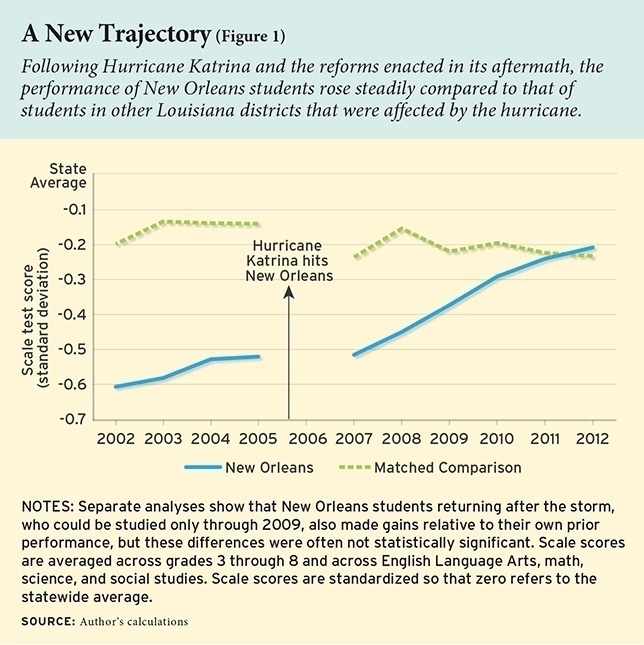by Pete Cook
With the 10th anniversary of Hurricane Katrina approaching, the nation’s attention is once again turning to New Orleans, seeking lessons from city’s rebuilding efforts, and in particular, from the revolutionary transformation of its public school system.
After a decade of increasing academic performance, including significant jumps in both high school graduation and college acceptance rates, it is long past time to put any lingering doubts about the reforms to rest. By now it should be clear that the decentralized, charter-based model we’ve created in New Orleans is a vast improvement over the perennially failing and corrupt system it replaced.
Nevertheless, for the past 10 years, a small but vocal group of critics have incessantly called into question whether the academic gains we’ve witnessed in New Orleans are real. As would be expected, many of these dissenters are those who saw their positions of power and influence disappear with the takeover of schools by the RSD. More recently, however, their voices have joined by a motley group of academics, armchair activists, and Johnny-come-latelies whose preconceived notions and ideological impulses tend to warp their perception of the district’s post-Katrina transformation.
#Nolaed results after almost 10 years in the #RSD so much for #edreform #AERA15 learn more at our 4:05 panel pic.twitter.com/SF7L5Uagwm
— Karran Harper Royal (@KHRoyal) April 19, 2015
Their message is usually some variation of the same old tired lie: the reform movement in New Orleans is a conspiracy by [insert: corporations, privatizers, neo-liberals, Teach For America, carpetbaggers, or any combination thereof] to disenfranchise the community and enrich private interests at the expense of the public good. Furthermore, they adamantly refuse to concede that our schools have improved since Katrina, in spite of overwhelming evidence to support that conclusion. As a result, these critics have been able to raise doubts in the minds of many about whether the reforms were effective…
…that is, until today.
This morning, Education Next published the results of a study conducted by the Education Research Alliance (ERA) at Tulane University which sought to definitively answer the question of whether New Orleans’ post-Katrina reforms led to higher academic achievement.
What did they find? In short, the reforms worked, no matter how you slice it.
As ERA’s Director, Doug Harris, states in today’s Education Next article, “Good News For New Orleans”:
“For New Orleans, the news on average student outcomes is quite positive by just about any measure. The reforms seem to have moved the average student up by 0.2 to 0.4 standard deviations and boosted rates of high school graduation and college entry. We are not aware of any other districts that have made such large improvements in such a short time.”

Moreover, the study controlled for many of the variables that critics have speculated could account for the increases in performance, including population changes, interim school effects, and test-based accountability distortions. Harris even finds that, “effects are also large compared with other completely different strategies for school improvement, such as class-size reduction and intensive preschool.”
You can read the entire article online here, or download it below.
[scribd id=273488818 key=key-rrGnVIzwnT92IGpiWdsP mode=scroll]
This post originally appeared on PE+CO on August 4, 2015.










